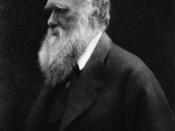With more than nine out of ten Americans believing God (Larson 278), one must speculate the philosophical reasoning behind confidence in something that is unable to been seen, felt, or heard. The Puritan philosopher Francis Bacon (1561-1626) said, ÃÂSmall amounts of philosophy lead to Atheism, but larger amounts bring us back to God.ÃÂ When thinking in terms of ideals and values, it is equally relevant to ponder the significance between fact and faith. Faith is defined as a belief that does not rest on logical proof or material evidence. On the other hand, fact is something that actually exists and is a truth known by concrete experience or observation. For the purpose of clarification, science can be described as an image of truth and religion as an element of faith. And since existence does indeed extend beyond AmericaÃÂs front and backyard, itÃÂs imperative to note that the three most popular sects in the world include two billion people that practice Christianity, one billion that follow Islam and one billion that are non-religious (National and World Statistics).
With the amount of religious groups totaling over four thousand, itÃÂs safe to say there is a religion tailored to the needs of each person but does religion equal faith?Francis BaconÃÂs school of philosophy is empiricism, which describes a theory that emphasizes the role of sensory experience in the development of ideas. In the philosophy of science, empiricism is a theory of knowledge which emphasizes those aspects of scientific knowledge that are closely related to experience, specially as formed through deliberate experimental arrangements. Very practical and utilitarian in nature, Bacon argued for a total separation of reason from personal interest, social conventions, human passions, etc. This reason versus revelation idea would eventually assist in the expansion of science and furthermore the separation...


